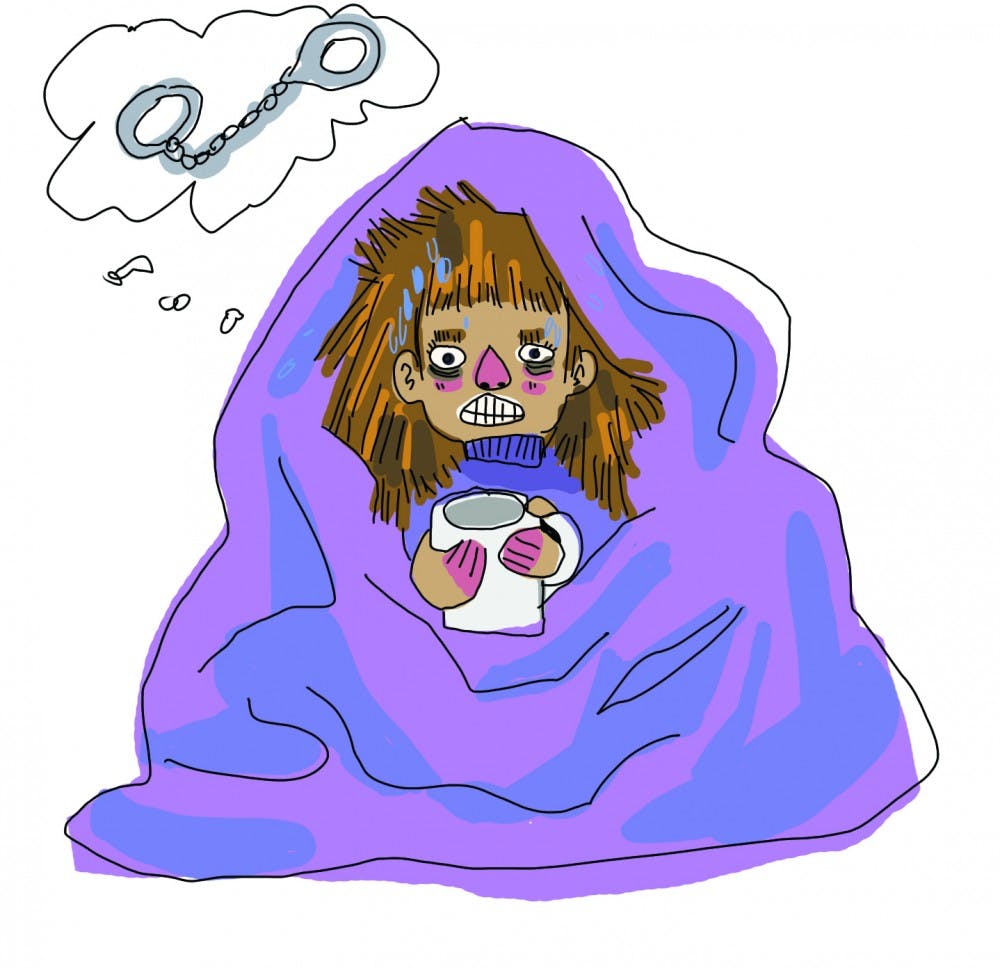I often get called a freak for this thing I like to do in bed. And, to be fair, it is quite out there. It’s weird, and some people think it’s unhealthy or even dangerous. But I can’t help it—my aversion to leaving my apartment unnecessarily and to sweet tastes results in a desire to sit alone in my room watching Gilmore Girls while drinking straight Smirnoff from a mug before every night out. I know, it’s bizarre. But I ask that you accept my choices, and me as a person, anyway. And I highly recommend experimenting with this pregame method if you feel comfortable.
I want to talk about a prevalent and toxic element of our culture: kink–shaming. The act of shaming someone for a particular thing they like to do sexually. Common shame–worthy kinks are spanking, choking and the employment of handcuffs. But this category includes basically anything different from the missionary position with purely logistical talking, moderate levels of eye contact and the lights off. If you act on your kinks with communication, you risk being called “a freak in bed" with "daddy issues." You risk being accused of trivializing consent. Women risk accusations of inviting abuse to themselves and their gender, while men risk accusations of wanting to inflict said abuse. And gossip flies through group chats faster than clothes to the floor when it turns out that you share a fetish for the Wizarding World of Harry Potter.
When prefaced with the word “sexual,” many words and concepts become suddenly wrought with controversy and taboos. (Sexual) preference. (Sexual) encounter. (Sexual) experimentation. It’s easy to let this word distract us from what we're really talking about, which is, even when it comes to kinks, just preferences—like my preference for spicy food, coconut–scented shampoo and flannel weather (I know right, TMI). We're talking about encounters and experimentation, all of which, in this case, just happen to be sexual.
This issue might seem trivial at first. You might be wondering why I am advocating for my right (and your right) to be kinky while not actually disclosing whether or not that is a right I choose to act on. Well, sorry to disappoint, but as interesting as that topic might be, it's not the one I'm addressing right now. I'm talking about the larger problem in our culture of which kink–shaming is a symptom: A widespread misunderstanding of the necessity of communication with regards to sex.
Given this reality, it’s understandable that some people fear that accepting kinks—particularly ones that involve some type of domination—is a slippery slope to accepting rape culture. But communication is already essential in any sexual encounter—how else are you supposed to get that required affirmative “yes”? As with the sex act itself, consent before and communication throughout are essential. And, while you’re at it, you might as well say what you want—you just might get it. I wonder if the fear of all things kinky is really fear of communication: Our culture’s lack of it and our responsibility to make it.
And obviously, just as you expect your partner to respect you for sharing your desired activity, you need to respect their decision to engage or not to engage in said activity. This should be the only risk associated with disclosing your kinks to your partner—a response of, “Uh, no, I’m not into the idea of you using a strap–on a dildo with Kevin Bone’s face on it to whack donuts out of my hand as I try to eat them. That does not turn me on. But I will not devalue or disrespect you or your body because of this kink.” Is that too much to ask for?
The bottom line is, there's nothing wrong with kinky sex, just like there’s nothing wrong with vanilla sex, as long as both happen only with explicit consent. We need to stop talking so much about our between–the–sheets experiences with other people and start talking more with the people we actually share them with. In the words of The Rolling Stones, “You can’t always get what you want, but if you communicate and proceed only with affirmative consent you might find you get what you need.”







